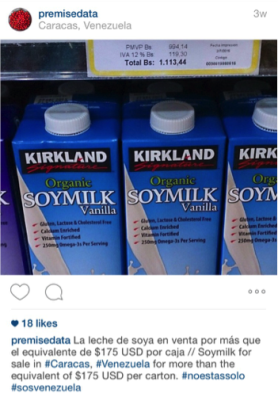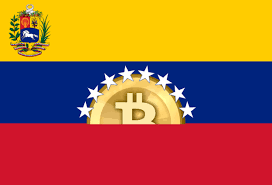Bitcoin to the rescue in Venezuela?
Venezuela may not have much milk or toilet paper these days, but it does boast some of the latest cutting edge financial technologies. Bitcoin, the virtual currency system that sidesteps traditional banking intermediaries to conduct financial transactions, is increasingly becoming the payment method of choice for a group of Venezuelan entrepreneurs. Is this a vote of confidence for virtual currencies in developing countries? Or desperate times breeding financial innovation in a crumbling economy? Perhaps a bit of both.
Premise, a San Francisco-based startup that crowdsources economic data, is now paying its contributors in Venezuela almost exclusively in bitcoin. In September 2015 Premise reported that it was paying just 10 percent of its contributors with the virtual currency. That figure has since shot up to more than 90 percent, with payments now being made through Coinbase, a popular “wallet” for bitcoin users.
By no coincidence the uptick runs parallel to the ongoing meltdown of Venezuela’s economy. The country depends on oil sales for around 95 percent of its export revenue. So plunging oil prices and massive public debt, financed largely by the government printing money, have sent the Venezuelan economy and its currency, the bolivar, into a virtual free fall.
As funds have dried up, the government of President Nicolas Maduro has imposed stringent price controls and restricted foreign currency transactions. Shortages of staple goods are now common throughout the country and a black market for the bolivar has flourished. Officially the government has fixed the value of the currency at 10 bolivars per dollar but the black market exchange rate recently topped 1,000 bolivars per dollar, according to local reports.
Bitcoin is a buzz-generating digital currency that will either revolutionize finance, fizzle out or fall somewhere in between. What future role does it have in development?
“No one knows what inflation is in Venezuela,” said Monica de Bolle of the Peterson Institute for International Economics. The International Monetary Fund calculates that annual inflation in Venezuela is around 700 percent, which would rank among the highest in the world. But even those estimates are murky because of what many consider to be unreliable data coming out of Caracas. “The country is in the process of imploding. Everything is imploding, including the currency,” she added.
It should come as no surprise then that as the value of the currency continues to plummet, Venezuelans are looking to store their wealth elsewhere. And in the case of Premise contributors, they are increasingly turning to bitcoin.
“Our contributors do not want to be paid in bolivars — it’s a currency that they’ve lost trust in,” Niki Sri-Kumar, a product manager with Premise, told Devex.
Premise manages a network of 30,000 contributors in 34 countries who work as local statistics providers by feeding real-time pricing data that Premise uses to construct broader economic trends. In practice, it can mean uploading pictures of food prices from local markets or of store lines — such as the ones across Venezuela — to serve as real-time indicators for inflation and potential food security threats.

Ironically, in Venezuela’s case, contributors are providing data on the very same economic conditions that are collapsing local currency and leading them to seek alternative forms of payment.
By crowdsourcing data Premise’s figures can often precede official government statistics by several months. The model has attracted tens of millions of dollars in venture capital over the past year along with grant funding from the Bill & Melinda Gates Foundation.
In exchange for data, contributors get paid on average between $100 to $120 per month and are paid in a variety of forms — from PayPal transfers to Amazon gift cards and of course bitcoin, which is now becoming a preferred payment method for Venezuelans.
Using bitcoin also serves the operational interests of companies such as Premise. Virtual currency systems like bitcoin serve three purposes — an actual currency to store value, a financial rail to move money and a ledger to record and store ownership information. For Premise, the rail feature is an efficient way to move money quickly and at much lower costs than traditional bank transfers.
Premise is also in the early stages of using bitcoin as payment in Colombia, Madagascar and the Philippines, but its uptake there is still low compared to Venezuela. India is the only other country where payments are made almost exclusively in bitcoin, though perhaps for different reasons.
All three of bitcoin’s purposes make it a potentially positive tool for development. For economies wrecked by inflation, it can be an alternative medium of exchange to the national currency. The rail feature can promote greater cross-border money flows at lower costs, particularly remittances from diaspora communities. And the open source “block chain” technology that bitcoin operates on can boost the type of financial transparency that is needed to stamp out public and corporate corruption.
For Venezuelans who are using bitcoin presumably as a store of value, the success of that strategy still largely depends on how large the local market for bitcoin grows. As with any medium of exchange, enough merchants, vendors and buyers need to adopt it for it to be a trusted and fungible currency.
Premise did not disclose its exact number of contributors in Venezuela but does say that its roughly 30,000 contributors are spread equally across Asia, Africa and Latin America. The shift toward bitcoin among those contributors therefore does point to a degree of acceptance and uptake in Venezuela.
There are still many challenges in less-developed or economically challenged countries as bitcoin looks to expand. The block chain platform that it runs on is more advanced and much less ubiquitous than widespread SIM networks that run more traditional mobile money systems such as M-Pesa in Kenya or BIM in Peru.
It also faces potentially stringent regulations, which tend to lag behind new technologies and their disruptive effects. The ruling socialist government in Venezuela has clamped down with strict regulations on the economy that control everything from the price of gasoline and rice to the amount of money that can be withdrawn from ATMs. While it has so far been unregulated, alternative methods for purchasing goods and services such as bitcoin are likely to face similar scrutiny.
But in countries with less government intervention or strict controls, companies such as Premise are optimistic that bitcoin and other virtual currencies are just beginning to take hold as a way to deliver greater financial flexibility and empowerment.
Via:https://www.devex.com/news/bitcoin-to-the-rescue-in-venezuela-87783

